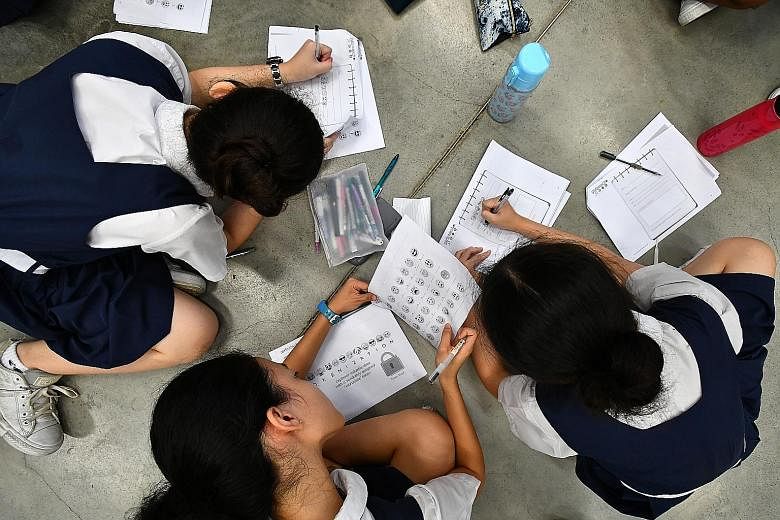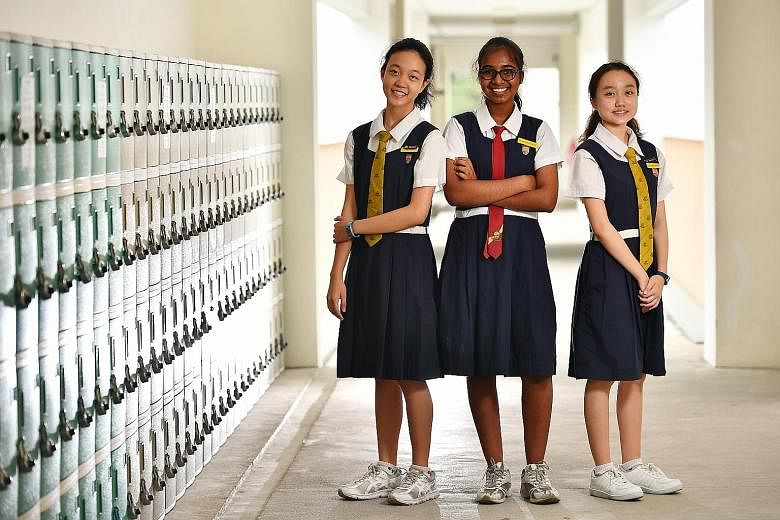When students huddle in a corner and ink secret, coded messages, most teachers would frown.
But not if it is to learn cryptology - the art of encrypting messages so that only the intended recipients can unravel and read them.
That was what Secondary 1 and 2 students at Paya Lebar Methodist Girls' School (PLMGS) did last Monday. They were learning cryptology, which was a vital way of communication between the allied forces during World War II.
Teachers had the students set aside their textbooks for the special mathematics and science lesson. It was part of a Girls4Tech programme, which aims to get girls interested in the field of science, technology, engineering and mathematics (Stem).
The programme by Mastercard was launched in 2014 and has reached more than 30,000 girls across 17 countries.
It made its debut in Singapore and China last year. In Singapore, the programme has reached more than 6,500 girls in more than 10 schools. They include St Margaret's Secondary School, CHIJ St Joseph's Convent, Da Qiao Primary School and Methodist Girls' School.
"For us, we want to ensure a steady pipeline of women in our industry, which is about creatively using technology in everyday life," said Mastercard's senior vice-president of communications Georgette Tan.
"We want girls to know that there is a need for them in this field and that they have the capabilities to fill that need."
According to a study earlier this year by the company, 37 per cent of 17-to 19-year-old girls in Singapore say that they may not choose Stem jobs despite studying relevant subjects.
More than half the girls from 12 to 19 years old were not interested in Stem, while 42 per cent of them felt that such subjects were difficult. Nearly half also felt that there was a gender bias in Stem jobs, as they saw it as a male-dominated field.
"We are doing our best to break such stereotypes," said Ms Tan.
"People shouldn't categorise jobs according to gender. After all, it is diverse viewpoints that help innovation. This is part of a bigger goal to empower women and help them to see the opportunities that are open to them, so even if they reject Stem jobs, it is an informed choice."
This programme comes amid a push by education institutes to get girls interested in Stem.
Earlier this year, the Cancer Science Institute of Singapore at the National University of Singapore hosted students from Nanyang Girls' High School as part of their Stem extended classroom programme. It was to ignite the girls' passion in science.
Mastercard has also partnered the Singapore Committee for UN Women to scale up the programme with both organisations supplying staff to administer it.
"The ratio of female to male researchers in Stem is seven to 20. We believe that by integrating stronger Stem concepts into early learning, showcasing female role models in Stem and countering the marketing of Stem concepts only to boys at an early age, we can enable girls to develop the sort of critical thinking skills needed in the workforce," said Ms Trina Liang-Lin, president of the Singapore Committee for UN Women.
Her organisation is also creating a curriculum to "make science fun" for girls.
Called "Girls2pioneers", the sessions allow girls to do hands-on work to solve real-world problems, such as building water filters and creating mini "bridges" using recycled materials.
Mastercard's programme is incorporated into this curriculum.
Elisa Chew, 14, one of the PLMGS students, said she enjoyed the session as cryptology is not commonly taught in schools.
Her classmate, Lim Zhi Xin, 14, said that the sessions were interesting. "They exposed us to things that we do not really learn about in textbooks. I do enjoy working with data so maybe this could be something I might look into in the future."
Amanda Grace, 14, said the lessons inspired her to realise her ambition of being a crime scene investigator. "I've always been interested in science and technology, but there is still this sense at the back of people's minds that it might not be a field for girls. These classes are good for us."
Mastercard aims to take their programme to 13,000 girls in Singapore by the end of next year.
Besides cryptology, the programme also teaches girls about big-data analytics, encryption and fraud detection.



